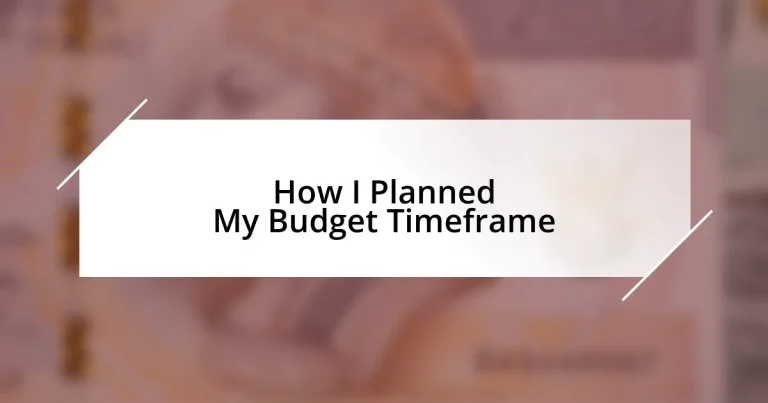Key takeaways:
- Establishing a budget timeframe helps anticipate costs and provides a roadmap for achieving financial goals.
- Regularly evaluating and adjusting financial goals is essential for adapting to life changes and ensuring effective budgeting.
- Choosing the right budgeting tools and engaging with a supportive community can enhance the budgeting experience and foster accountability.
- Monitoring and reflecting on spending habits can lead to better financial health and empower individuals to make informed adjustments.
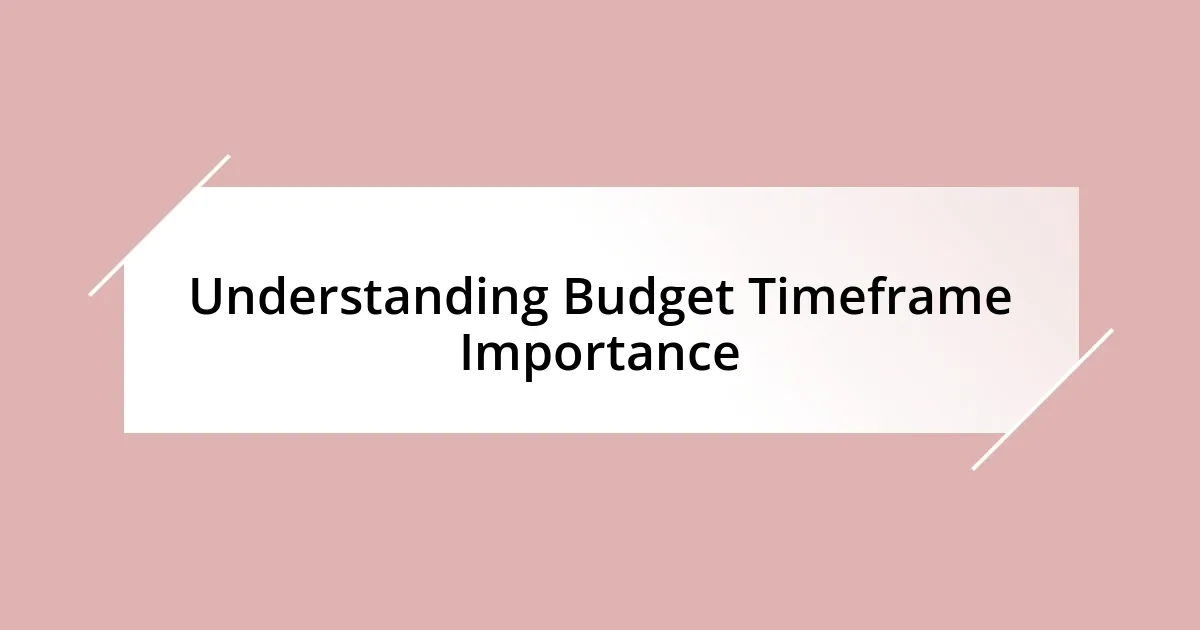
Understanding Budget Timeframe Importance
When I first started managing my budget, I quickly learned that timeframe is everything. I remember feeling overwhelmed by expenses that popped up unexpectedly, which taught me how essential it is to plan my spending over the short and long term. Have you ever found yourself caught off guard by a bill you forgot to account for? It’s a frustrating experience that could have been avoided with a clear timeline.
Establishing a budget timeframe not only helps in anticipating costs but also provides a roadmap for achieving my financial goals. For instance, when I set a goal to save for a vacation, I broke it down into monthly contributions rather than a daunting lump sum. This not only made my goal feel attainable but also added excitement to my saving journey. What are your financial aspirations, and how are you tracking them?
Moreover, sticking to a budget timeframe can be a real game-changer in cultivating financial discipline. I recall a time when I vastly underestimated my grocery spending, leading to a month of tight restrictions. By aligning my food budget with a specific timeframe, I adapted my shopping habits, learned to cook more, and ultimately saved money. Isn’t it interesting how a planned timeframe can influence not just our finances but our lifestyle?
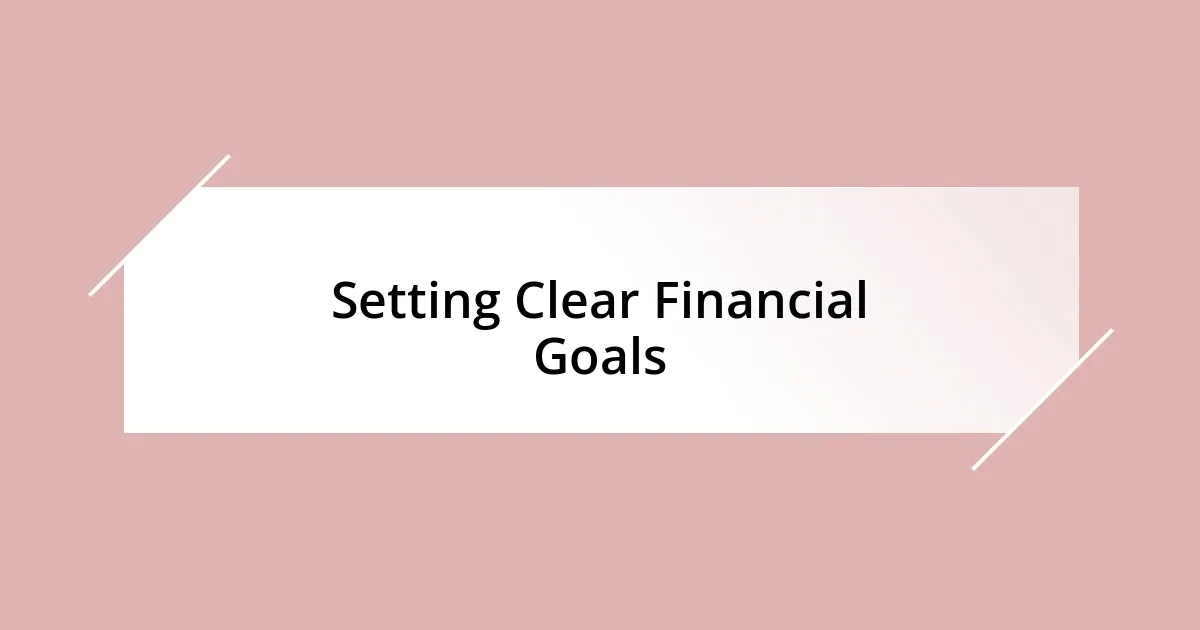
Setting Clear Financial Goals
Setting clear financial goals has been a transformative experience for me. One day, while going through my monthly expenses, I realized I had no direction. It hit me then: without clear goals, budgeting felt like navigating a ship without a compass. Now, I approach goal-setting with precision, identifying what I want — whether it’s saving for a new car or building an emergency fund. Having distinct targets keeps my motivation alive and my spending in check.
Breaking down these goals into smaller milestones significantly eases the process. When I wanted to contribute to my retirement account, instead of viewing the total amount as an overwhelming challenge, I broke it into manageable monthly savings. Each month felt like a small victory, reminding me of the bigger picture. Have you tried celebrating smaller achievements on your financial journey? I found that it not only boosts morale but also creates a sense of accomplishment as I inch closer to my larger goals.
It’s essential to revisit and adjust these financial goals regularly. There was a point when I set my sights on a lavish vacation. However, as life happened, I needed to reallocate my resources towards unforeseen medical expenses. That experience taught me the value of flexibility in financial planning. Our goals should inspire us, but they must also evolve with our circumstances. How are your goals adapting to your life’s changes?
| Goal Type | Example |
|---|---|
| Short-term | Saving for a weekend getaway |
| Medium-term | Building an emergency fund |
| Long-term | Retirement savings |
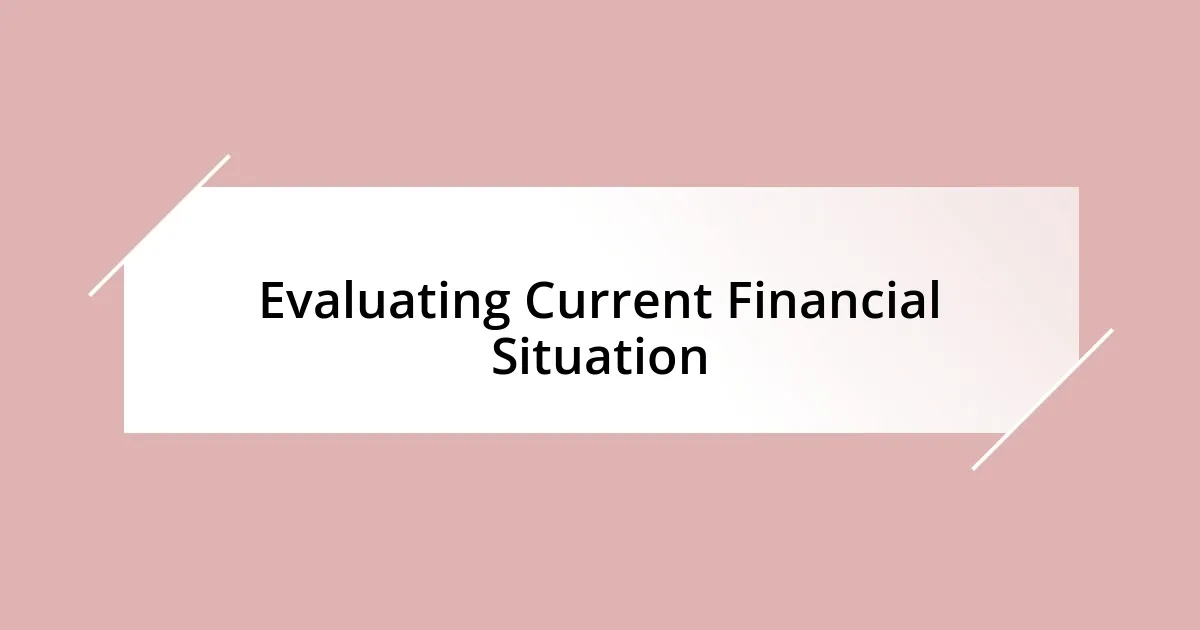
Evaluating Current Financial Situation
Evaluating my current financial situation was a pivotal step in my budgeting journey. I remember sitting down one evening, feeling the weight of uncertainty about my expenses. I pulled together my bank statements and bills, which made the numbers feel more real. It’s surprising how gaining clarity on my financial landscape sparked motivation to take control. Understanding where my money goes each month illuminated patterns I hadn’t noticed before.
To effectively evaluate your financial situation, consider these key aspects:
- Income: What’s your total monthly income? Include all sources.
- Fixed Expenses: List your unavoidable costs like rent or mortgage, utilities, and insurance.
- Variable Expenses: Identify your fluctuating costs such as groceries, entertainment, and dining out.
- Debt Obligations: Document any loans or credit card payments to comprehend your financial obligations.
- Savings: Rate your current savings and any financial goals associated with them.
Taking a comprehensive look at these factors not only provides a clearer picture but also sets the foundation for more informed budgeting decisions. When I first did this, identifying areas where I could cut back on unnecessary expenses became a revelation. It felt empowering! As you reflect on your own finances, remember, this exercise is not just about numbers; it’s about recognizing the power you have to mold your financial future.
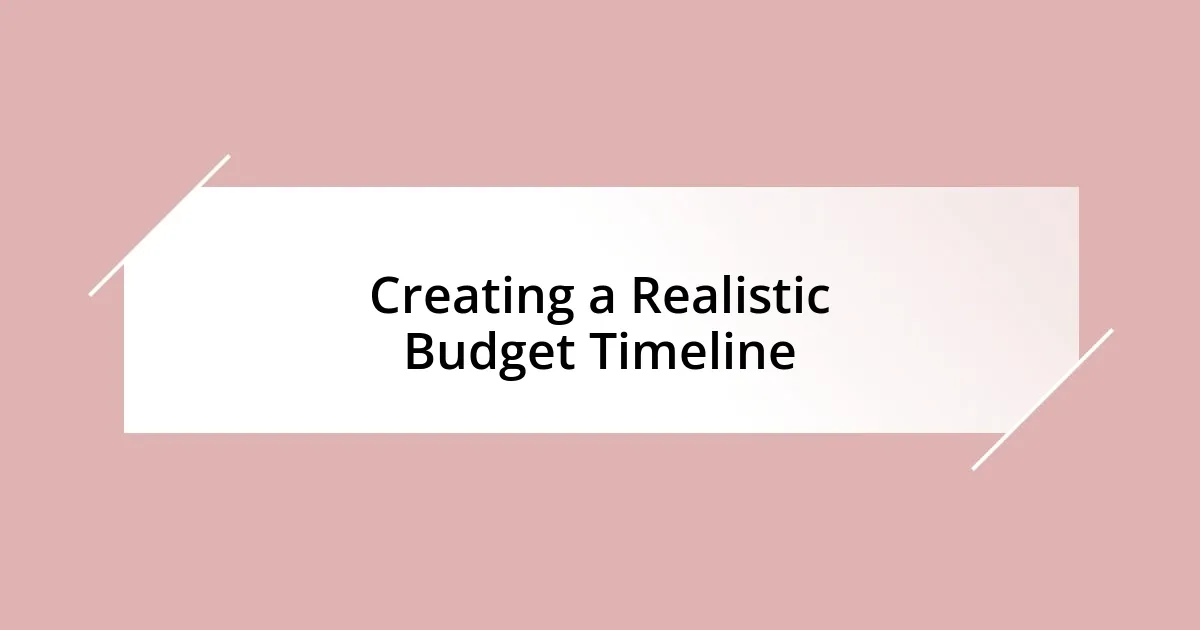
Creating a Realistic Budget Timeline
Creating a realistic budget timeline requires a thoughtful approach. When I first decided to map out my budget period, I chose a three-month horizon. This timeframe was manageable and allowed me to anticipate my expenses more accurately. It was astonishing how seeing my financial commitments laid out helped me prioritize what truly mattered. Have you ever felt lost in your budget? A timeline can be a guiding light.
I started with my fixed expenses, like rent and utilities, then moved on to variable costs, like groceries and entertainment. Each category felt like a puzzle piece fitting into a broader picture. I learned that timing is everything. For instance, aligning my discretionary spending around paydays provided a cushion and reduced stress. It was a game changer! By visualizing when money would come in and go out, I felt more in control of my finances.
Adjusting my budget timeline became an ongoing practice. Each month, I revisited my goals and evaluated if they still aligned with my current situation. One month, I planned a weekend trip, but an unexpected car repair required me to shift my priorities. Instead of feeling defeated, I embraced the change and adjusted my budget timeline to accommodate both my needs and desires. How do you handle unexpected financial shifts? It’s a reminder that budgeting isn’t static; it’s a dynamic journey that requires flexibility and resilience.
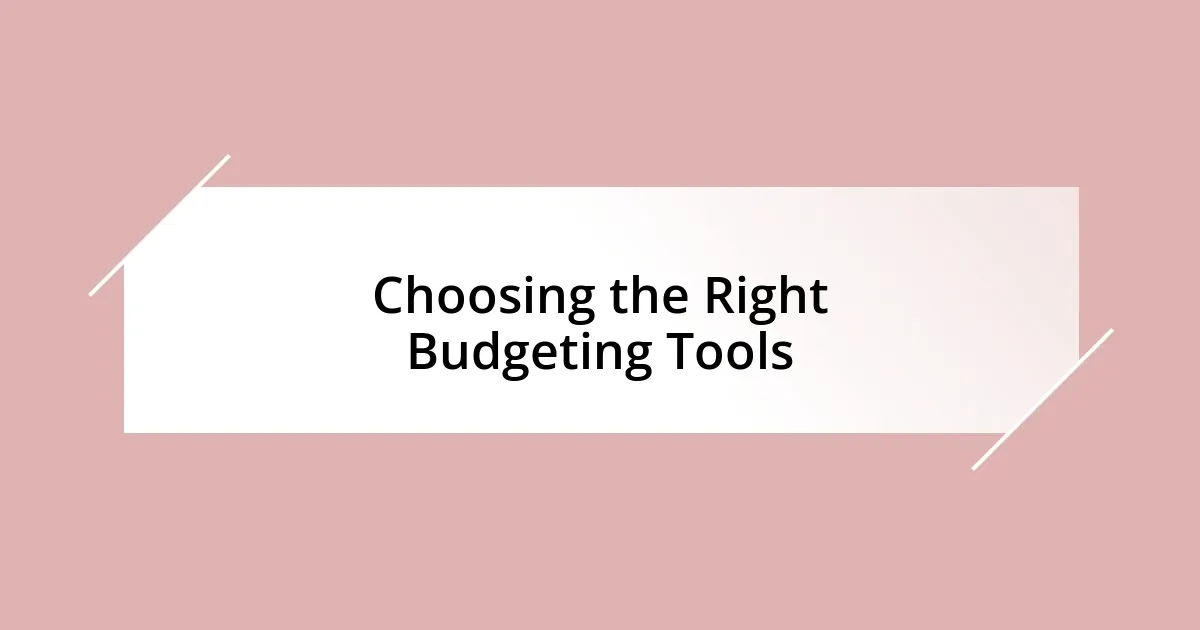
Choosing the Right Budgeting Tools
Choosing the right budgeting tools is essential for effective financial management. Initially, I was overwhelmed by the variety of options available—from apps to spreadsheets and even pen and paper. Each tool offers unique features, but what truly matters is finding the one that aligns with your personal style. For instance, I discovered that I thrive in digital environments, so budgeting apps with user-friendly interfaces became my go-to.
Another factor to consider is the level of detail you want in your budgeting process. I remember experimenting with several apps that offered extensive tracking features, yet I found such complexity more frustrating than helpful. The simplicity of a basic spreadsheet eventually won me over. This way, I could customize my budget categories and display my financial data in a manner that was both comprehensible and visually appealing. Have you thought about what level of detail best suits your needs?
Lastly, don’t overlook the power of community in your budgeting journey. Sometimes, I’ll browse online forums or social media groups to seek recommendations on tools others have found effective. Hearing personal success stories and tips from fellow budgeters was motivating and made my transition to new tools smoother. Are you ready to join a supportive community? The right tools don’t just track your spending; they can also inspire accountability and foster connections as you embark on your budgeting adventure.
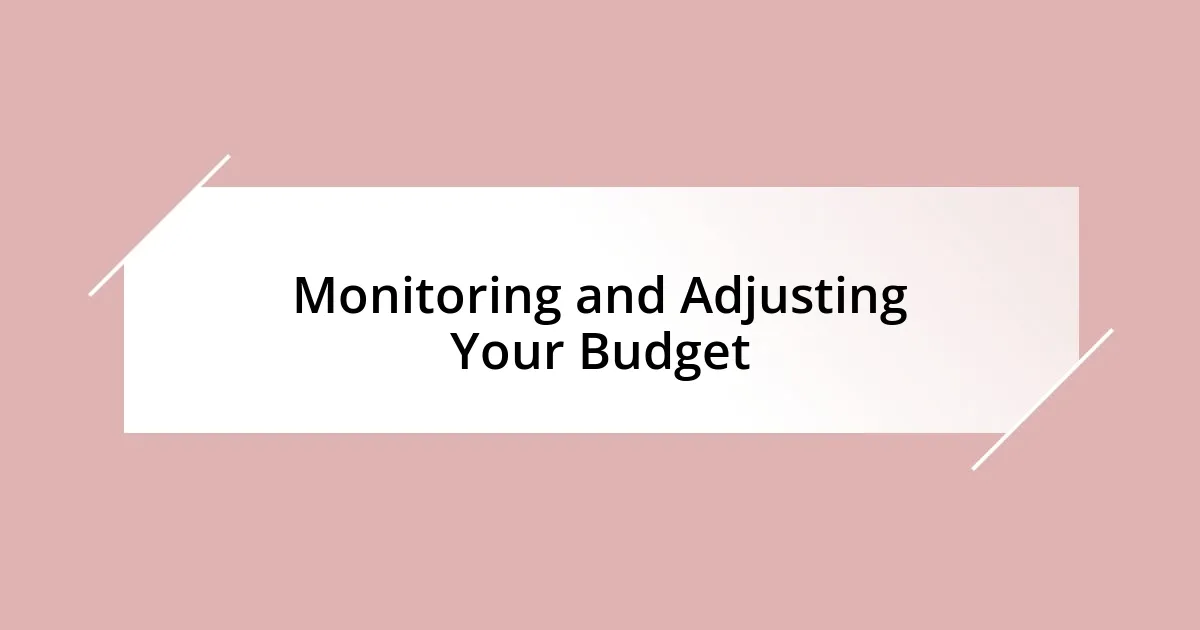
Monitoring and Adjusting Your Budget
Monitoring your budget is as crucial as planning it in the first place. I vividly recall a month when I had to track my expenses meticulously. To my surprise, I realized I was overspending on takeout, which led to a moment of reflection. Have you had a similar realization? By making a quick adjustment—allocating more towards cooking at home—I not only saved money but also discovered a newfound joy in exploring recipes.
As I dove deeper into monitoring, I started to categorize my expenses with greater precision. Utilizing color-coded spreadsheets brought a sense of playfulness to budgeting that I didn’t expect. Embracing this visual aspect made the process feel less daunting and more like a creative project. Isn’t it fascinating how small changes can transform an intimidating task into an enjoyable experience?
Adjusting your budget based on consistent monitoring is where the real magic happens. After tracking my spending for a few months, I decided to allocate more funds towards my emergency savings. This proactive shift not only provided me peace of mind but also reinforced the importance of adaptability in financial planning. Have you considered how regularly adjusting your budget can lead to better financial health? Trust me, it’s empowering to know you’re in control, willing to make changes as life unfolds.
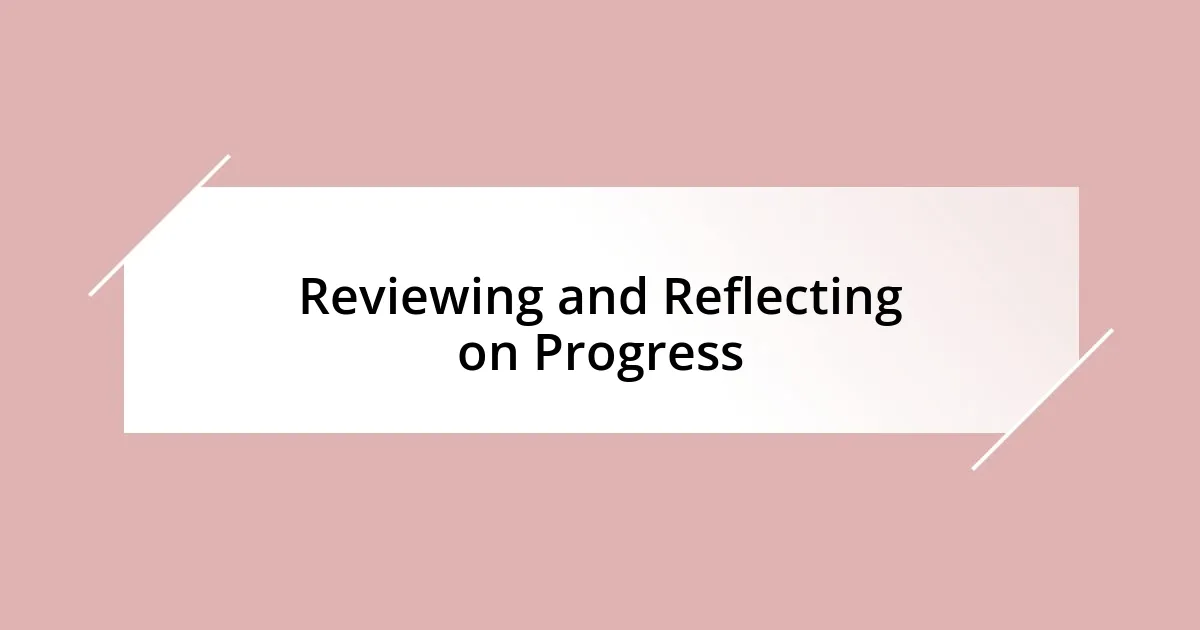
Reviewing and Reflecting on Progress
Reflecting on my budgeting progress has been a vital part of my financial journey. I remember sitting down at the end of each month to review my spending habits, and I often felt a mix of pride and surprise. It was eye-opening to see how far I’d come, but also essential to pinpoint where I could improve. Have you ever felt that rush when you realize you’ve made smarter financial decisions?
One moment that stood out to me was when I assessed my discretionary spending against my goals. I was amazed to discover that I had unknowingly been neglecting my savings for a travel fund, which I had initially been so excited about. This reflection prompted me to readjust my budget priorities. By setting specific milestones and tracking my progress toward that trip, I ignited a sense of excitement and purpose in my budgeting process. How do you think reflecting on your goals could shift your financial focus?
I’ve found that journaling my thoughts during these review sessions deepens my understanding of my choices. Each entry not only helps me track my monetary decisions but also reveals my emotional relationship with money. For instance, after a month where I had spent more on entertainment than I intended, I reflected on the reasons behind those choices. It wasn’t just about the money; it was about the joy of connection with friends. This kind of introspection enriches my budgeting experience and reinforces my commitment to balance enjoyment with financial responsibility. Isn’t it fascinating how a simple reflection can turn numbers into a narrative about our lives?












